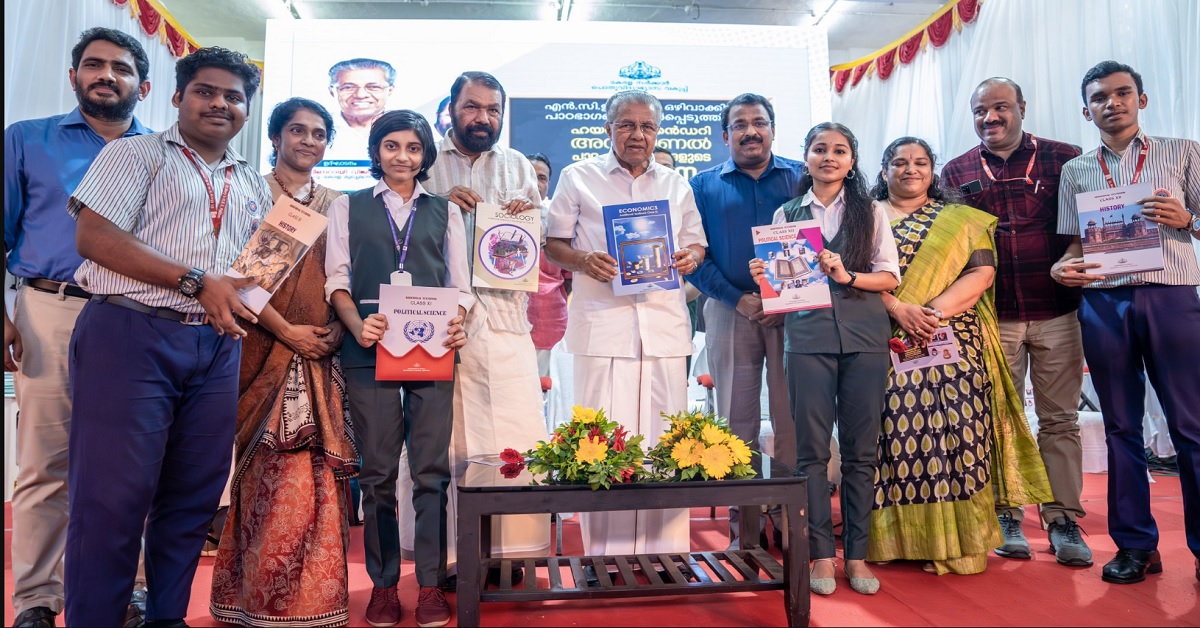On August 23, 2023 Kerala Chief Minister Pinarayi Vijayan unveiled revised textbooks for classes 11 and 12, containing portions recently deleted by the National Council of Educational Research and Training (NCERT). The release event took place at a government school in Thiruvananthapuram, where select students were handed the updated textbooks for subjects including history, political science, economics, and sociology.
With the Kerala SCERT releasing supplementary texts that now include RSS ban, Gujarat riots, Mughal history to stay in Kerala syllabus, Kerala becomes the first state to reassert constitutional first principles of federalism: Education comes under the State Article 1 of the Indian Constitution states, ‘India, that is Bharat, shall be a union of states’. The distribution of powers between the union and state governments is what makes India a federal country. In India, there are three lists divided between the center and state governments, i.e. Union List: It includes areas of national importance like defense, foreign affairs, currency, banking, and communications.
With 52 items in the Concurrent List of the Indian Constitution that include subjects of common interest to both the Union as well as the States. These include education, forest, trade unions, marriage, adoption, and succession. What is the state list in Indian Constitution? The State List is a list of 66 subjects in the Schedule Seven to the Constitution of India. The respective state governments have exclusive power to legislate on matters relating to these items. The Union List details the subjects on which the Parliament may make laws while, the state list details those under the purview of state legislatures. The Concurrent list on the other hand has subjects in which both Parliament and state legislatures have jurisdiction.
Now, the Curriculum Committee of Kerala’s SCERT has decided to release a supplementary textbook by SCERT to cover these portions. Earlier, Education Minister V Sivankutty had stated that Kerala will not accept the central decision to exclude subjects like RSS ban, caste system and social movements from the curriculum.
According to Hindustan Times, CM Vijayan expressed deep concern over the changes introduced by NCERT for the 2023-24 academic year. He criticised the “rationalisation” process, which led to the removal of crucial segments from the syllabus. The CM stated that these eliminated lessons were vital components that should never have been expunged.
“The lessons that were deleted were those that should not have been removed. As a result, we have prepared additional textbooks by including those portions that should not have been taken out,” asserted CM Vijayan. The state government’s move aimed to preserve the integrity of education, prevent skewed perspectives, and ensure that students are presented with a holistic view of history and society.
The CM shared the news on Twitter, with the following caption: “A set of new textbooks was unveiled, with sections that were omitted by the NCERT, seemingly driven by a political agenda aimed at undermining scientific awareness and democratic values. This marks Kerala’s unwavering stand against the Sangh Parivar’s insidious attempts to transform our educational institutions into breeding grounds for communalism.”
A set of new textbooks was unveiled, with sections that were omitted by the NCERT, seemingly driven by a political agenda aimed at undermining scientific awareness and democratic values. This marks Kerala’s unwavering stand against the Sangh Parivar’s insidious attempts to… pic.twitter.com/VaBXmb5zl0
— Pinarayi Vijayan (@pinarayivijayan) August 24, 2023
Jayaprakash RK, the director of State Council of Educational Research and Training (SCERT), revealed that six textbooks across four subjects were promptly revised by incorporating sections removed by NCERT.
CM Vijayan further highlighted that the removed sections included significant events such as the assassination of Mahatma Gandhi, raising concerns about an attempt to distort historical narratives for political interest. He further stated that the omissions from textbooks could potentially pave the way for glorifying individuals and organisations associated with Gandhi’s assassination, leading to a dangerous erosion of social values. The textbooks released by the CM also count the deletion of Mughal history, industrial revolution, partition of India, five-year economic plans, and capitalism.
Background
The corrections were made in textbooks from 6th to 12th grades as part of ‘syllabus rationalisation’.
The NCERT has omitted references of Maulana Abul Kalam Azad, a freedom fighter and India’s first education minister , from the new political science textbook for class 11. The council also dropped certain portions including lessons on Gujarat riots, Mughal courts, Emergency, Cold War, Naxalite movement, among others from its textbooks citing ‘overlapping’ and ‘irrelevant’ as reasons..
Related
While Modi plays the OBC card, backward castes & Adivasis remain excluded from Central University
UP: Scribe Faces FIR for Highlighting School Textbooks Meant for Poor Kids Being Sold as Scrap
The SC’s decision on ASI Survey of Gyanvapi: An analysis
Sitapur, UP: Muslim couple beaten to death as son had eloped with Hindu woman years ago

